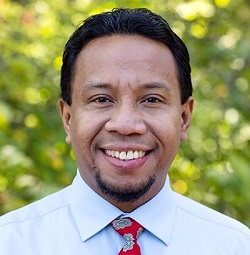Commentary on Philippians 4:1-9
Partisan politics. When one thinks about American politics, that’s what comes to mind.
As the election draws closer, the partisan politics intensify each day. We’ve built walls of defense between one another and sent arrows of offence flying around social media. The presidential debate between President Donald Trump and former Vice President Joseph Biden at the end of September was more debacle than debate, a national embarrassment, a vivid reflection of an already deeply divided country.
People in the United States are inhabiting two different worlds, watching different news cycles, hearing different radio talk shows, reading different newspapers. Echo chamber discussions with like-minded people are our main mode of political engagement. There is a serious lack of respectful dialogue between people with different views, different opinions, different ways of life. The whole country seems to be divided into two camps: the liberal vs. the conservative, Republicans vs. Democrats, the urban vs. the rural, the South vs. the North, and so on.
The consequence of the partisan politics is clear: people are ready to put loyalty to party above humanity, above morality, above common good, above justice and mercy, above human decency and dignity. That we find it more acceptable that over two hundred thousand fellow humans in this country alone have died from COVID-19 than to cross political lines to find the best way out of this problem, we have hit a new low. People and politicians have seemed to have forgotten that the virus is non-partisan. It affects us all, regardless of political allegiance. So, it is no surprise that America has become one of the countries most affected by this virus.1
In the Philippian church, the alleged conflict between Syntyche and Euodia seems to have bothered Paul. We do not know the exact nature of this conflict. Maybe there is no conflict at all, just different views, different positions. Difference is a fact of life. Perhaps if we were able to ask Syntyche and Euodia, they might have told a different story than the one Paul narrates. Paul’s is a one-sided story. Nonetheless, what Paul said about them (or to them) is worth pondering in our socio-political context today.
I urge Euodia and I urge Syntyche to be of the same mind in the Lord. Yes, and I ask you also, my loyal companion, help (syllambanou) these women, for they have struggled (synethlesan) beside me in the work of the gospel, together with Clement and the rest of my co-workers (synergon), whose names are in the book of life. (Philippians 4:2–3)
In spite of their differences, Paul here encourages them to “be of the same mind in the Lord.” What does this mean? The Greek expression parakalo to auto phronein is literally translated as “I encourage you to think the [same] thing.” But what is this thing, this to auto, that he encourages them to think? The next verse gives us a good hint. Paul describe both of them as people who “have struggled together beside” him and others like him in the work of the gospel.
Here Paul is reminding Syntyche and Euodia that of course they have differences, but that it is also important to remember their togetherness, their collectiveness, what they have in common. Their differences should not hinder them from working together for the common good. Three times Paul uses compound words that begin with syn– (together) in this text (syllambanou, synethlesan, synergon). This sense of togetherness is a way of life rather than a system of thought. It refers to an attitude that welcomes and works with others. It is no surprise, therefore, that when Paul speaks of rejoicing or gentleness in verses 4-5, he uses a plural expression—of doing these things together.
The word chairete (rejoice!) in verse 4, for instance, is a plural imperative verb. It refers to a collective rejoicing, a communal feeling of gladness. We can gather from the immediately preceding context that the idea of “rejoicing” here must have something to do with the issue between Syntyche and Euodia, with Paul’s reminder that they were his fellow fighters. So, rejoicing in this text refers not to a personal state of being, but to a communal atmosphere of joyfully embracing difference. Instead of turning differences into an ugly exclusionary fight, differences are to be welcomed in a joyful way.
That being said, different voices or polyphony in a community should not be reduced to one voice, into a monoglossia—to borrow a term from Russian philosopher Mikhail Bakhtin.2 Paul’s instruction to “think the same thing” can easily become a monoglossic discourse. But such monoglossic force can only be deconstructed from within the text itself. Paul says “I urge Euodia and I urge Syntyche” (Euodian parakalo kai Syntychen parakalo). The repetition of the verb parakalo (I urge or encourage) is not grammatically necessary at all. He could just have said “I urge Euodia and Syntyche.” Although the repetition is not grammatically necessary, it is a rhetorical strategy to maintain and to display in a vivid way the particularity of each person. This text, therefore, is not so much about unity as about dialogical togetherness, interconnected collectivity.
Let me circle back to American partisan politics. Politics is a messy business because people have different opinions, different ways of thinking, and so on. We do not need a false form of “unity” in which differences are disavowed, erased. What we need is to move beyond partisan politics and work together for the common good.
Fighting the spread of COVID-19, for instance, should not be a partisan issue. Can we all be “co-fighters” and “co-workers” in this unprecedented time in history when the virus has spread to every corner of the world like wildfire? Can we set aside our partisan loyalty and see our response to the virus as a common fight for the future of humanity?
Notes:
CNBC, “Dr. Fauci Agrees the U.S. Has the Worst Coronavirus Outbreak in the World,” August 5, 2020. https://www.cnbc.com/2020/08/05/dr-fauci-agrees-the-us-has-the-worst-coronvirus-outbreak-in-the-world-the-numbers-dont-lie.html
See M. M. Bakhtin, The Dialogic Imagination: Four Essays, ed. Michael Holquist, trans. Michael Holquist and Caryl Emerson (Austin: University of Texas Press, 2004).


October 11, 2020